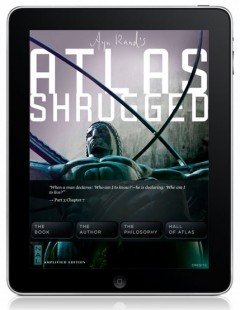
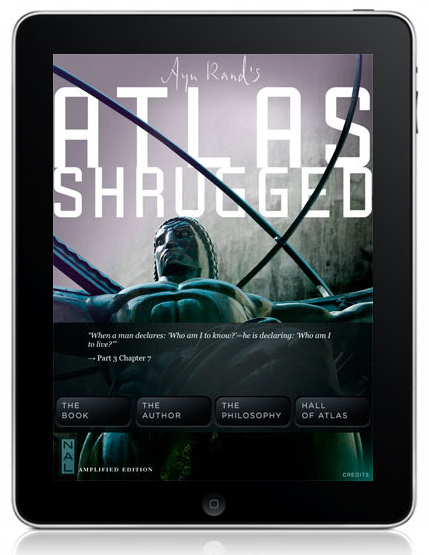 The Ayn Rand’s Atlas Shrugged book app for iPad has been awarded the App Fiction prize in the 2012 Publishing Innovation Awards. The award was handed out at the recent Digital Book World Conference.
The Ayn Rand’s Atlas Shrugged book app for iPad has been awarded the App Fiction prize in the 2012 Publishing Innovation Awards. The award was handed out at the recent Digital Book World Conference.
In addition to the novel itself, the app “includes some of Rand’s lectures, additional articles for further reading on Rand and her philosophies, a timeline of events in Rand’s life as well as the works she published, and other materials.” If you own an iOS device, you might want to check it out, but it will cost you $14.99.
In related news, filming for Atlas Shrugged: Part Two is scheduled to begin in April. The first film was not great (see Matthew Alexander’s review) and didn’t do so well financially. It doesn’t bode well that the second film will have a smaller budget and a new director and may have some central characters recasted.
~*~
But back to Apple-related news, one P.J. Rey over at The Society Pages: Cyborgology has an interesting article about “How Cyberpunk Warned against Apple’s Consumer Revolution.” There are at times anti-corporate progressive and Marxist overtones in the article — Rey even references Marx’s notion of “false consciousness” — but nevertheless Rey’s criticism of Apple in light of cyberpunk’s tendency toward individualist anarchism should be of interest to radical libertarians of all stripes.
[continue reading…]
Help Promote Prometheus Unbound by Sharing this Post

Few philosophies have a greater mutual suspicion and natural antipathy to each other than libertarianism and ecology. This is not surprising, since the former takes the human individual and the latter the nonhuman environment, as its sovereign concern. But since our state-plagued era has seen the degradation of both individual liberties and the quality of the environment, we ought to question the degree to which these exist in an inverse relationship. Libertarians who wish to learn how to accommodate ecological ideas could do no better than to begin with a short 1975 novel by Ernest Callenbach, not because the novel has any libertarian intent (it clearly doesn’t), but because the principle of political decentralization, which Callenbach sees as an ecological necessity, leads him unconsciously, almost blindly, in a libertarian direction.
Ecotopia was clearly born out of the political and economic turmoil of the 1970s. As the book describes it, “The persistent inflation and recession of the seventies had caused widespread misery and undermined Americans’ confidence in economic progress.… And chronic Washington scandals had greatly reduced faith in central government.” Of course there was also a war that dragged on and on despite widespread opposition. In other words, it was a time much like our own, which may be why there has been a renewal of interest in the book in the last few years. A New York Times article from 2008 called it “The Novel that Predicted Portland” for its advocacy of green lifestyles. Well, not quite, as we shall see.
While contemporary greens tend to advocate greater power for national and international governmental agencies to regulate on behalf of the environment, Callenbach’s book was informed by decentralist and anti-authoritarian ideas of the New Left. These led him to a solution that had long since been thought impossible in American politics: secession. Ecotopia is also the name of a new nation in the novel, consisting of what used to be Oregon, Washington, and northern California, which seceded from the United States in 1980.1 In 1999, Will Weston, a journalist from what remains of the United States, sets out to write a series of articles about Ecotopian life. These, alternating with Weston’s private diary entries, comprise the novel.
[continue reading…]
Help Promote Prometheus Unbound by Sharing this Post
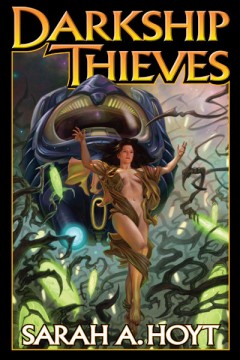
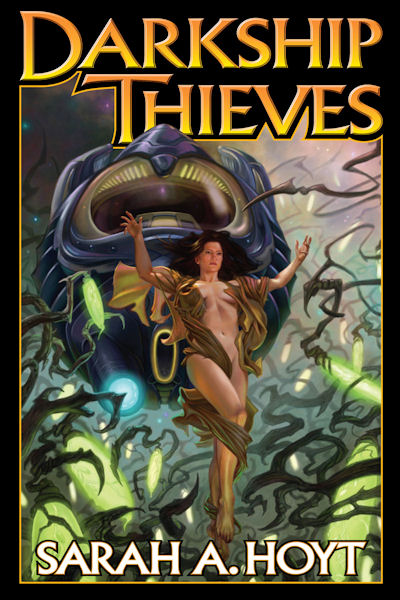 The Libertarian Futurist Society has announced this year’s winners of their Best Novel and Hall of Fame awards.
The Libertarian Futurist Society has announced this year’s winners of their Best Novel and Hall of Fame awards.
Alas, I didn’t get around to reading and reviewing Cory Doctorow’s For the Win in time for the voting, but I still plan on doing so. Matthew Alexander reviewed another of the finalists, L. Neil Smith’s Ceres.
Here’s the official press release:
The Libertarian Futurist Society will hold its annual awards ceremony for the Prometheus Award during Renovation, the 69th World Science Fiction Convention, to be held Aug. 17-21 in Reno, Nevada. The specific time and location will be available in the convention program.
The winner of the Best Novel award is Darkship Thieves, by Sarah Hoyt (Baen Books). The Hall of Fame award was won by Animal Farm, a short novel written by George Orwell in 1945. Sarah Hoyt will receive a plaque and a one-ounce gold coin, while a smaller gold coin and a plaque will be presented to Orwell’s estate.
Darkship Thieves features an exciting, coming-of-age saga in which a heroic woman fights for her freedom and identity against a tyrannical Earth. Hoyt’s novel, dedicated to Robert A. Heinlein, depicts a plausible anarchist society among the asteroids. Hoyt is a prolific writer of novels and short fiction, though this is her first time as Prometheus finalist.
[continue reading…]
Help Promote Prometheus Unbound by Sharing this Post
The Seasteading Institute, dedicating to “homesteading” and living on the seas, is having a short story contest. Winners will have their stories featured on the institute’s website.
From their press release:
[continue reading…]
Help Promote Prometheus Unbound by Sharing this Post
In a recent addition to The Libertarian Tradition podcast series, part of the Mises Institute’s online media library, Jeff Riggenbach discusses The Ambiguous Utopias of Ursula K. Le Guin and Samuel R. Delany.
You can also read the transcript, which was published on Friday as a Mises Daily article.
In the podcast, Riggenbach discusses Le Guin’s novel The Dispossessed: An Ambiguous Utopia and Delany’s novel Triton: An Ambiguous Heterotopia.
Help Promote Prometheus Unbound by Sharing this Post
Finalists for the 2011 Prometheus Award for best libertarian novel were announced just yesterday. One finalist, Ceres, by past award-winner L. Neil Smith, has already been reviewed on Prometheus Unbound. Also making the cut is Cory Doctorow’s For The Win. I have a copy of this novel and plan to review it soon, after I publish a few overdue reviews.
As a reminder to our readers, we are open to submissions of reviews (as well as news, articles, interviews). Even if you can’t contribute regularly, we’d like to have a number of part-timers on our staff who only contribute occasionally. We’re even open to one-time contributors.
So if you’d like to read and review one of the other Prometheus Award finalists, nominees, past winners, or another piece of fiction, we’d be happy to consider it for publication.
Below is the full press release from the Libertarian Futurist Society, which presents the Prometheus Award:
[continue reading…]
Help Promote Prometheus Unbound by Sharing this Post
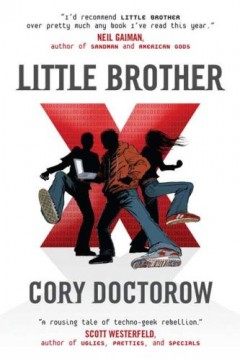
Cory Doctorow’s Little Brother is a tale about tech-savvy teenagers as they rebel against a Department of Homeland Security crackdown following a terrorist attack on San Fransisco. A piece of YA fiction that even adults can enjoy — it’s YA largely because of its teenage protagonists and its educational aim at young people — Little Brother is the 2009 Prometheus Award winner for best libertarian novel. Little Brother also won the John W. Campbell Memorial Award and was a finalist for the Hugo Award.
Little Brother is set entirely in San Fransisco, California, in the very near future. Much of the technology in the story is already available, and what is not can easily be conceived as being on the horizon. The story is told entirely in the first person, from the point of view of the main character, Marcus Yallow. Marcus at first goes by the handle w1n5t0n (Winston in leetspeak, a homage to George Orwell’s 1984, as is the title of the book) but later switches to M1k3y (which could be a reference to the computer Mike in Robert Heinlein’s The Moon is a Harsh Mistress).
As the story opens, we are introduced to Marcus and three of his friends — Jolu (Jose Luis), Van (Vanessa), and best friend, Darryl — who ditch school to play an ARG (Alternate Reality Game) called Harajuku Fun Madness in and around the city. They happen to have the misfortune of being in the wrong part of town when terrorists blow up the Bay Bridge. In the chaos and confusion that follows, they get picked up by the Department of Homeland Security and then subjected to several days of interrogation and psychological torture in a “Gitmo by the Bay” before being released (with the exception of Darryl) with threats to keep quiet about their experience…or else. But once set free, Marcus and his friends are disturbed to see their city being turned into a police state.
Marcus resolves to fight back against the DHS, to restore civil rights and liberties and to free Darryl. He soon becomes the unofficial leader of a growing, decentralized movement of rebellious teenagers. But his covert struggle starts to put a strain on his relationships with his family and friends.
[continue reading…]
Help Promote Prometheus Unbound by Sharing this Post
 The Ayn Rand’s Atlas Shrugged book app for iPad has been awarded the App Fiction prize in the 2012 Publishing Innovation Awards. The award was handed out at the recent Digital Book World Conference.
The Ayn Rand’s Atlas Shrugged book app for iPad has been awarded the App Fiction prize in the 2012 Publishing Innovation Awards. The award was handed out at the recent Digital Book World Conference.












